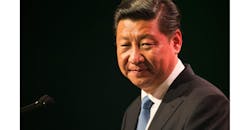Trump Praises China’s Xi's Trade Speech, Easing Tariff Tensions
U.S. President Donald Trump praised Xi Jinping’s “kind words” on trade after the Chinese leader reaffirmed pledges to open his nation’s banking and manufacturing sectors -- signaling an effort to defuse a burgeoning trade war.
“Very thankful for President Xi of China’s kind words on tariffs and automobile barriers,” Trump said on Twitter. “Also, his enlightenment on intellectual property and technology transfers. We will make great progress together!”
Xi pledged a “new phase of opening up” Tuesday in a keynote address to the Boao Forum for Asia. While the speech offered little new policy and made no mention of Trump, Xi affirmed or expanded on proposals to increase imports, lower foreign-ownership limits on manufacturing and expand protection to intellectual property -- all issues central to the U.S. president’s trade complaints.
Talks between the world’s biggest economies broke down last week after the Trump administration demanded steps to curtail China’s support for high-technology industries, a person familiar with the situation said. The conciliatory tone of Xi’s speech helped bring risk appetite back to markets, and shares rose from Sydney to New York. The S&P 500 ended up 1.7%.
White House Press Secretary Sarah Huckabee Sanders said Xi’s speech is “a very good sign of moving in the right direction,” but “we want to see concrete steps and concrete action” from China.
Talks hit a snag over U.S. efforts to curb Beijing’s “Made in China 2025” program, which identifies 10 local industries to make globally competitive by 2025, and globally dominant during this century. The U.S. has accused China of unfairly subsidizing targeted sectors and forcing foreign companies to transfer technology in areas like robotics, aerospace and artificial intelligence.
Xi’s top economic adviser, Vice Premier Liu He, told a group of officials last Thursday that Beijing had rejected a U.S. request to stop subsidizing Made in China 2025 industries and wouldn’t initiate further talks, the person said. The U.S. had earlier rejected a Chinese proposal to narrow the trade deficit by $50 billion, including by importing more liquefied natural gas, agricultural products, semiconductors and luxury goods, the person said.
The offer represented half of Trump’s demand for the country to reduce its trade surplus by $100 billion. Trump, who has also requested reduced tariffs on cars and ending technology transfers, has threatened to levy some $150 billion of tariffs against China. Beijing has retaliated by proposed $50 billion of tariffs on American goods, and pledging further action if necessary.
Repeating Promises
Xi’s speech gave no ground on the industrial push, which is central to his plan to complete China’s rise as great power by the mid-century mark. Instead, he elaborated on existing plans to open lower-tech manufacturing and financial services sectors, where China sees foreign investment as improving competitiveness and helping develop a more consumer-focused economy.
The pledge to cut the country’s 25% import tariff on vehicles -- a promise first made by Premier Li Keqiang last month -- heeded a decades-old plea from companies seeking access to the world’s largest auto market. China imported 1.22 million vehicles last year, or about 4.2% of the country’s total sales of about 28.9 million automobiles.
The Chinese president also used his speech to continue to present himself as a champion of trade and multilateral institutions, a role traditionally played by U.S. presidents. While he didn’t mention Trump, he warned against a “Cold War mentality” and took a veiled swipe at the U.S. leader’s “America First” polices.
“Paying attention only to one’s own community without thinking of others can only lead into a wall,” Xi said. “And we can only achieve win-win results by insisting on peaceful development and working together.”
By Justin Sink
About the Author
Bloomberg
Licensed content from Bloomberg, copyright 2016.
